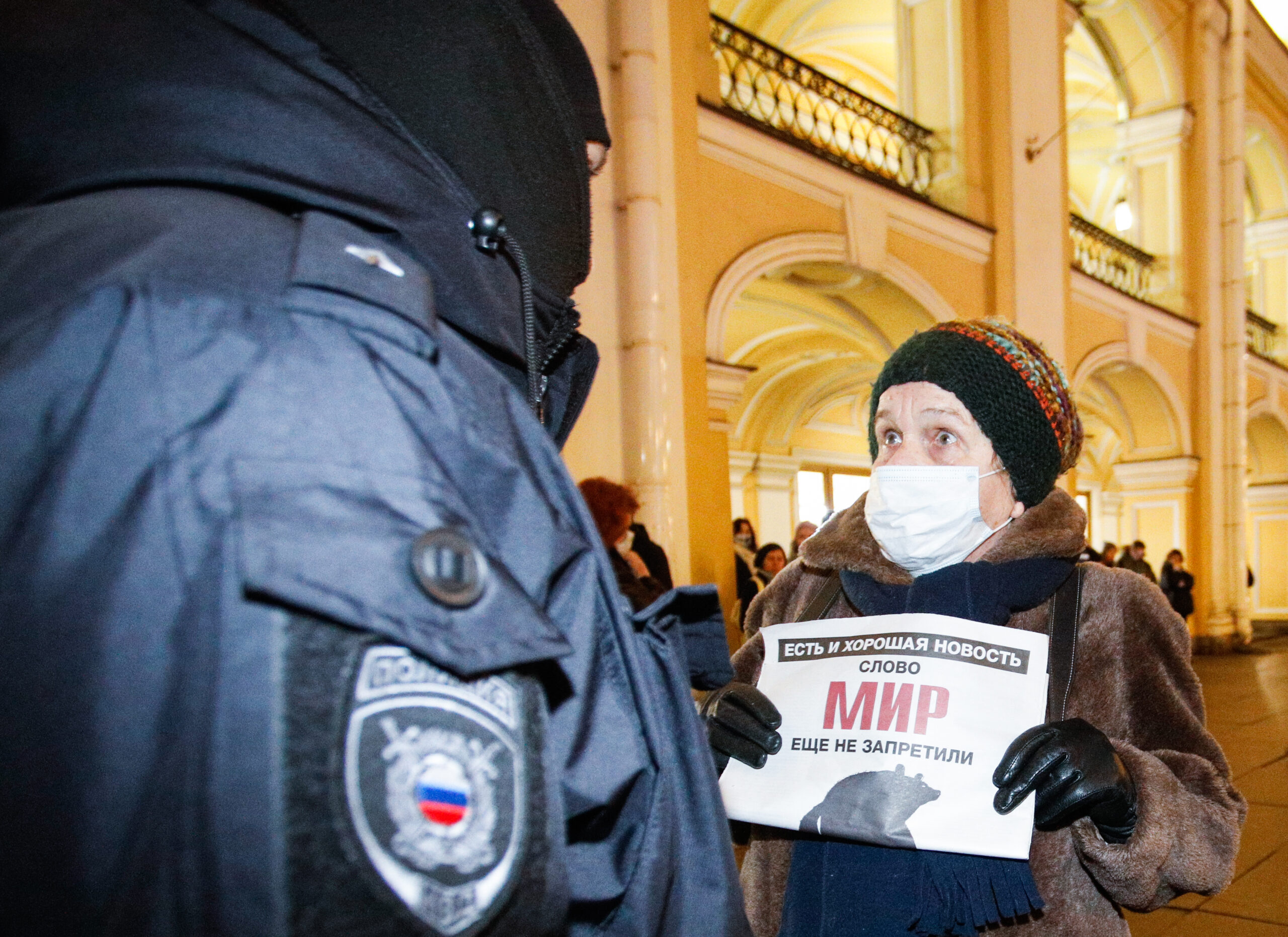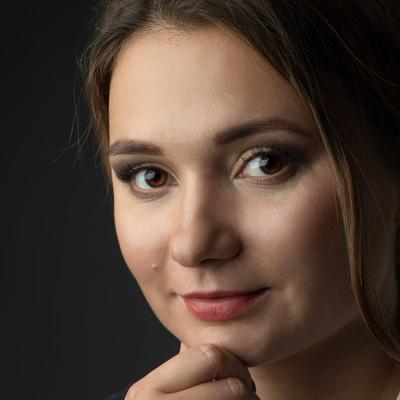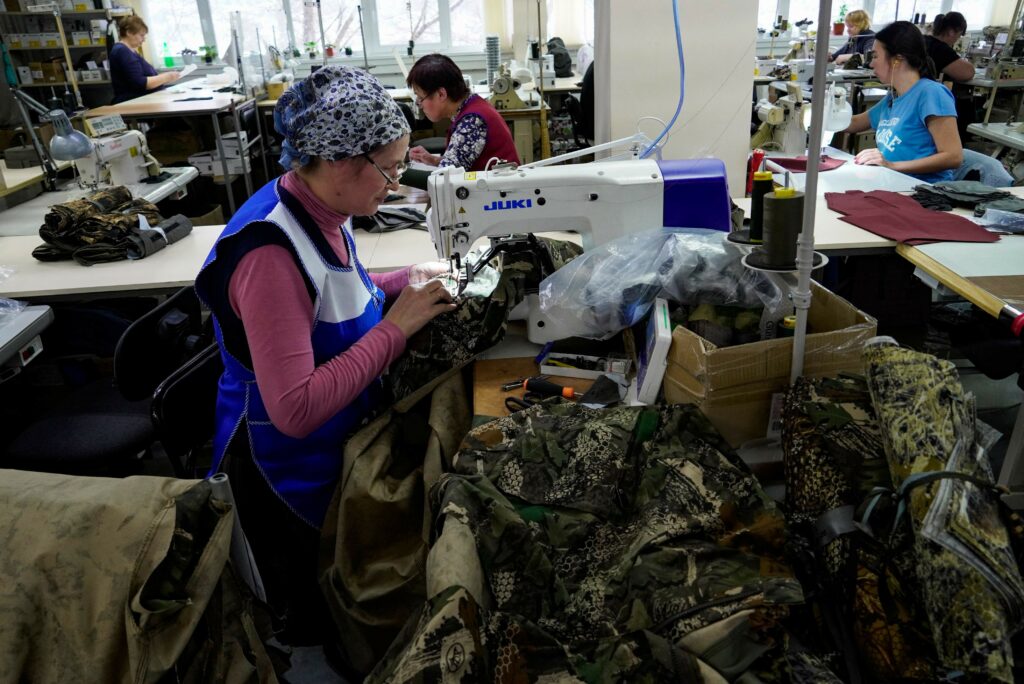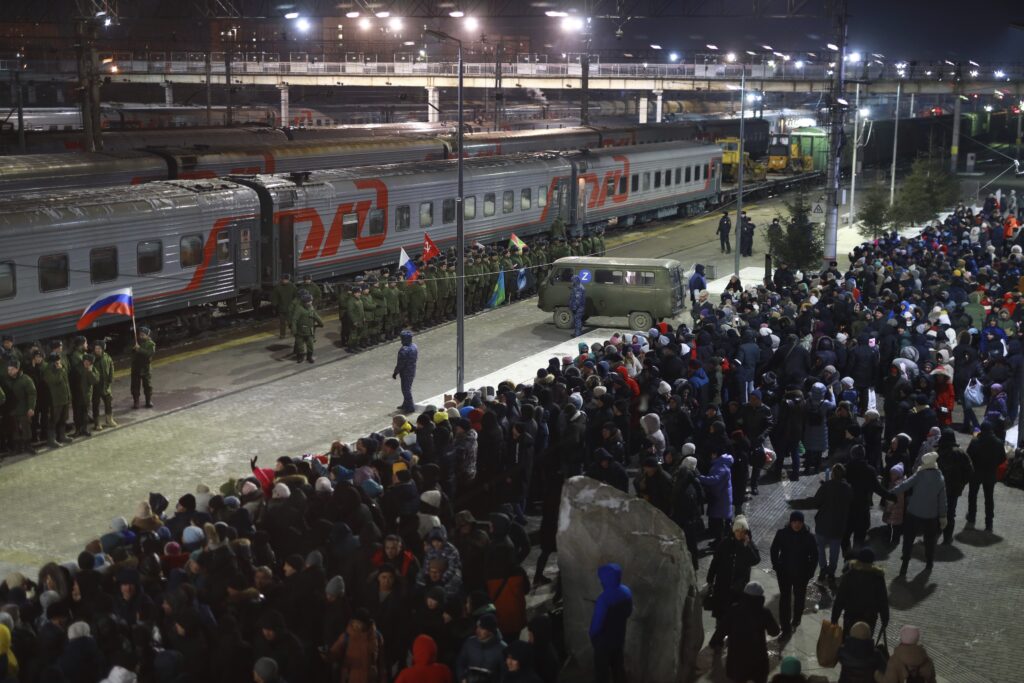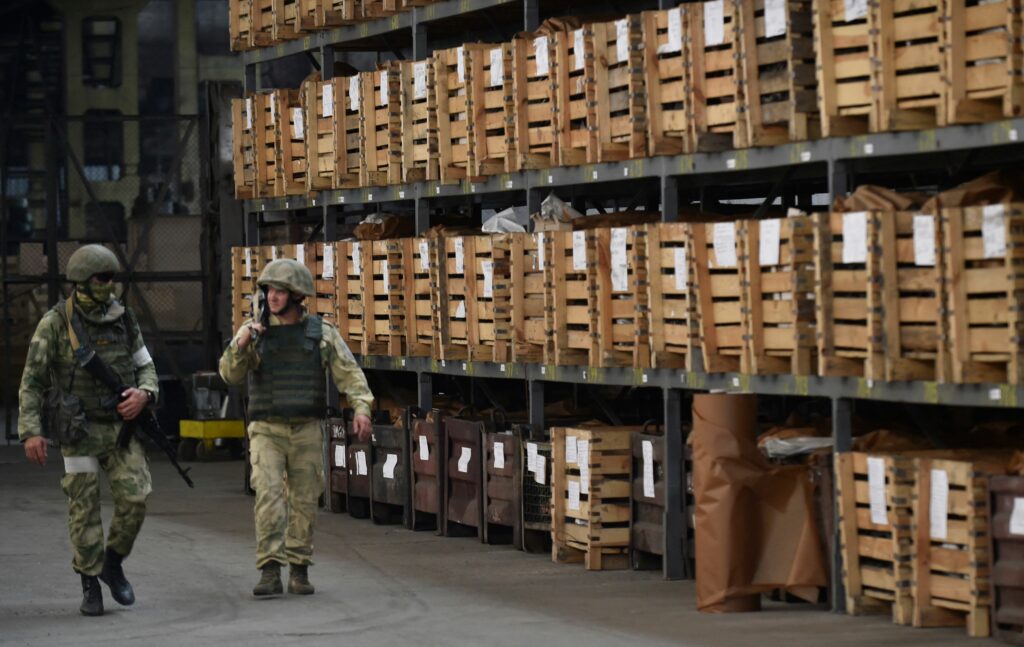Against the backdrop of Russia’s full-scale military invasion of Ukraine which began on February 24, Western society is increasingly asking the question: why don’t Russians go to anti-war protests en masse? Does this mean total support for the actions of the Russian president? Or is the situation, as it often happens, actually much more complicated than it might seem to an onlooker?
At your own risk
In recent years, the Russian government has done everything possible to prevent mass demonstrations. This is not only about how any protest of more than one person must be coordinated in advance with the authorities (who, of course, will always find a reason to refuse). There have also been difficulties for lone picketers, which has become one of the few legal ways to express discontent. They can be detained without cause.
At the same time, it is also now impossible even just to call for unsanctioned actions (just to publish information about the place and time of the rally). This is punishable under 20.2 of the Code of Administrative Offenses, or even 212 of the Criminal Code of the Russian Federation. There is no limit to the ingenuity in applying these articles. For example, an 18-year-old resident of Moscow was charged with «participation in an unsanctioned action» (part 5 of article 20.2 of the Code of Administrative Offenses) for hanging a poster «No to war» on her balcony. You can also go to prison for violence against law enforcement officers, merely by throwing a paper cup in their direction. Or you can be jailed for blocking transport communications during an action, violating sanitary and epidemiological standards, or plain old hooliganism. The list goes on. In Ufa, in the Republic of Bashkortostan, a criminal case was opened under the article on incitement to extremism (part 2 of article 280 of the Criminal Code) against Aytugan Sharipov, who was detained on February 24 at an anti-war rally for his messages on WhatsApp about the situation in Ukraine. According to OVD-Info, Sharipov was tortured with electric shocks, beaten and demanded to admit that he worked for Ukrainian intelligence while in the FSB office. On March 3, the Prosecutor General’s Office announced that participants in anti-war actions could also be prosecuted under the article on participation in the activities of an extremist organization (part 2 of article 282.2 of the Criminal Code).
In 2021, the Kremlin effectively decapitated the non-systemic opposition, jailing Alexei Navalny and declaring his Offices and the Anti-Corruption Foundation (FBK) «extremist organizations». Protests in support of Navalny were suppressed with particular severity: participants were beaten, many were subject to administrative and even criminal cases. Throughout the year, repressions against journalists and individual media outlets, human rights activists and active representatives of civil society continued. It seemed that civil society was entering 2022 in a state of paralysis.
Despite all this, since February 24, unauthorized protests and individual pickets have been taking place in many cities of Russia every day. According to OVD-Info, as of March 3, more than eight thousand people were detained during the anti-war protests during this time. Many people signed appeals condemning the war. A petition launched by Lev Ponomarev on the Change.org website has already gained more than a million signatures. Doctors, scientists and students, representatives of culture and art, architects, IT specialists and representatives of other professions made up their own open collective letters against the war. The reaction of the authorities was not long in coming: those who had signed anti-war appeals began to be fired.
Thus, to say that there is no anti-war resistance in Russia would be untrue. However, the possibility of expanding this movement is still facing a powerful adversary: state propaganda.
War is peace
At Riddle, we have reported more than once that Russian authoritarianism rests on three pillars: a relatively stable economy, fear, and lies. The sanctions imposed in connection with military actions against Ukraine are destroying the first pillar, leaving the other two in the arsenal of the authorities. Relying on anti-Western propaganda and disinformation, which are aimed at creating fear among Russians for the security of their country, and coupled with the virtual monopolization of the media field, the Russian authorities effectively form their own picture of reality for a significant number of Russians.
From the first days of the war, the authorities stepped up the fight against the dissemination of information that contradicted the official line. Since February 25, the Prosecutor General’s Office has sought to restrict access to Facebook. A day earlier, Russia’s media watchdog Roskomnadzor (RKN) demanded that the Russian media use only official Russian sources when preparing materials related to the «special operation».
Moreover, RKN fixated on the choice of words: the state censor ordered several publications, including Novaya Gazeta, to remove «materials in which the ongoing operation is called an attack, an invasion, or a declaration of war.» For «inaccurate» information about the war in Ukraine, the RKN has already blocked several Ukrainian and a number of Russian independent publications: «Current Time», «Taiga.Info», TV Rain, the student magazine DOXA (earlier, the RKN demanded that the magazine removed the material «Handbook for Anti-War Disputes» which refuted 17 arguments that the militarists use to justify Russia’s military aggression), «Crimea.Realii», The New Times, Echo of Moscow (in addition to blocking, the radio station was taken off the air), The Village. On March 3, the Board of Directors of Echo of Moscow shuttered both its radio channel and its website. On the same day, the director general of the channel, Natalya Sindeeva, announced the suspension of the work of TV Rain.
So in one day, Russian society lost two important sources of information. But the story did not end there: on the night of March 3−4, news broke that the website of the popular Riga-based independent news outlet Meduza, alongside the websites of the BBC, Radio Liberty and Deutsche Welle, were all being blocked. Thus, the information blockade of Russia is becoming a reality.
On March 2, the State Duma considered amendments to the Criminal Code. These would offer punishment of up to 15 years in prison for any person disseminating «false information» about the activities of the Russian Armed Forces. The same day, the head of the Investigative Committee, Alexander Bastrykin, ordered the creation of investigative groups to «immediately respond to incidents in connection with the events in Ukraine, suppress extremist and terrorist manifestations, uncoordinated protest actions and provocations». It is reported that the Investigative Committee will also be engaged in «suppressing the dissemination of false information about events related to the conduct of a special military operation to protect the LPR and DPR by criminal law means». So already, the ground is prepared for erasing the remnants of objective information about Ukraine.
Then again, a significant part of the population, especially older demographics, opt for state-aligned news channels rather than independent ones anyway. To understand the picture of events presented to Russians who do not use independent sources, I looked at all the state news broadcasts almost every hour, and the releases of the Vremya programs on Channel One for the period from February 24 to March 2. In general, news on other federal channels and socio-political talk shows repeat the narratives presented on Channel One, differing only in emotional overtones. The driving themes:
- The West provoked Russia. The morning of February 24 on Channel One began with the broadcast of Putin’s address, in which he accused the West of anti-Russian policies and blamed it for what was happening: «For our country, this is ultimately a matter of life and death, a question of our historical future as a people (…) This (US policy — author’s note) is a real threat not just to our interests, but to the very existence of our state, its sovereignty». On the same day, a statement by the international association of veterans of the Alpha anti-terror unit appeared in the news: «For eight years, the United States and NATO have done everything to create a state hostile to Russia out of Ukraine.» The Vremya program reported that the foreign ministers of Russia and China came to a common opinion that «the crisis in Ukraine is caused by Kyiv’s refusal to implement the Minsk agreements, encouraged by the United States and its allies». On February 27, Channel One’s morning broadcast showed air footage from Fox News with former U.S. presidential candidate Tulsi Gabbard stating that «Biden could have averted this crisis with the simple act of ensuring that Ukraine does not become a member of NATO. Because if that happens, US and NATO troops will be on Russia’s doorstep, which Putin said would undermine its national security». In the same story, the presenter focused on how Russia had been trying to initiate dialogue with the United States for two months, «but Washington did not want to agree on anything.» This was followed by arguments that the current conflict «plays into the hands of American military corporations.» President Biden, «instead of resolving the military conflict, on the contrary, adds fuel to the fire.» Plus, the pro-government media actively speculated on the nuclear threat from Ukraine. On Sunday, February 27, Putin released the following message: «The appearance of tactical nuclear weapons in Ukraine means a strategic threat for us (…) Moscow will be in the kill zone (…) Ukraine’s entry into NATO and the subsequent deployment of NATO facilities here is a foregone conclusion». Further, the host of the program told the viewers that «in the American nuclear doctrine of 2020 and other strategic planning documents, it is Russia that is named the main military adversary. They also point to the possibility of a preventive disarming strike and a preventive nuclear strike. The story ends with Putin’s words: «Ukraine will serve as a base for such an attack».
- «Noble» Russian «liberators» vs. Ukrainian «treacherous nationalists». From the first day of the military campaign, all news releases emphasized that Russia «does not launch rocket, air or artillery strikes on Ukrainian cities. There is no threat to the civilian population.» At the same time, it was reported every day that Ukrainian troops allegedly acted in the opposite way. For example, in the morning segment of February 24, the presenter was struck by «the cynicism of the Ukrainian security forces with which they destroy the inhabitants of Donbass, including children, women, and the elderly. The Armed Forces of Ukraine are shelling schools, kindergartens and hospitals.» In the broadcast at 18.00, against the background of reports that the Armed Forces of Ukraine were allegedly «shooting at eleven settlements», footage of two civilians killed was shown. Such shots are obviously designed to evoke a strong emotional response from viewers. On February 25 at 10 a.m., two stories were released to reinforce this narrative: the first said that «over the past night, the Ukrainian army opened fire 33 times on residential buildings, on ten settlements of the republic (LPR — author’s note), seven houses were damaged», the second segment showed footage from street cameras in large Ukrainian cities, which, according to the host «despite the hysteria of the Ukrainian and Western media» were not destroyed. In the following days, it was reported that the Armed Forces of Ukraine were allegedly mining the city beaches in Odessa, along which «families with children walk.» These days, the words of the official representative of the Ministry of Defense, Igor Konashenkov, were widely disseminated: «In advance, the Security Service of Ukraine infiltrated groups of notorious nationalists numbering from 25 to 30 people who underwent special training into the regular military units of the Armed Forces of Ukraine. Nationalists identify unreliable soldiers among the Ukrainian military, and if the commanders of the Armed Forces of Ukraine make a decision to withdraw from the occupied lines, they act as barrage detachments. (…) Multiples cases of lynching and reprisals by nationalists over conscripts unwilling to fight to intimidate the personnel of the Armed Forces of Ukraine has been recorded». On February 26, a story appeared on the news about how «Ukrainian nationalists» allegedly «shot a soldier of the Armed Forces of Ukraine who wanted to cross the border in order to refuse to participate in hostilities and take refuge in our country». In the following days, it was reported that «Bandera and neo-Nazis are hiding heavy weapons, including multiple launch rocket systems, in the central areas of large cities, including Kyiv and Kharkov. They are trying to call back fire from Russian strike systems on residential areas. That is, they act like terrorists, hiding behind people in the hope of later blaming Russia for civilian casualties. And all this is done according to the teaching of American instructors». But the presenters reassure the audience: «Russians are not being provoking, precisely destroying military equipment outside the cities, and under no circumstances striking residential urban areas.» On March 1, Russian news reported that «militants of the infamous Azov battalion are preparing to shell residential buildings, and in the LPR, the Ukrainian military mined warehouses with ammonia and intend to blow them up in the near future». On March 2, the Ukrainian security forces were accused of «acting deliberately with the aim of killing and harming an unlimited number of people» and also that «the Nazis, who seized power in Kharkov, are trying to disrupt the evacuation of civilians». With the help of such messages, the Russian authorities create the impression that all the destruction of civilian infrastructure is the work of the Ukrainian military, and Russian units allegedly fire exclusively at military facilities. Such a technique helps to dehumanize Ukrainian soldiers in the eyes of viewers of official Russian propaganda.
- «Genocide of the Russian-speaking population». In an address on February 24, Putin announced that the purpose of the launched special operation was «to protect people who have been subjected to abuse and genocide by the Kyiv regime for eight years.» Later, this message was repeated more than once by presenters, correspondents of news programs and other politicians. So, on February 25, Sergei Lavrov made a similar statement, hinting that Kyiv was under external control, «imprisoned to encourage neo-Nazism, to encourage the genocide of Russians and to use Ukraine as a tool to contain Russia». The word «genocide» in general evokes a strong negative emotional response, as does the word «Nazism», which is also often used by Russian television. So, for example, the words of Zyuganov (leader of the Russian Communists) circulated in the media: «Today I watch how this gang raises children from morning to evening in the Nazi ideology of hatred for the entire Russian people.» Lavrov was even more often quoted as accusing Western colleagues of «tacitly encouraging the rapid development of neo-Nazism and Russophobia» in Ukraine. Over time, the statements became ever more rigid. Already on March 1, Lavrov declared that «the ultranationalists and Nazis who seized power in Kyiv as a result of a coup d’état supported by the West unleashed real terror.» By March 2, a news anchor reported about a secret prison in Mariupol, where allegedly «all these years they tortured and mocked those who sympathize with the Russian world.» All these psychological and linguistic techniques, based on societal pain, are designed to dehumanize the adversary, turn him into an enemy conditioned by historical memory. At the same time, direct historical parallels are also used. For example, in a report from Donetsk on February 27, a local soldier, speaking to people hiding in the basement, says: «Now our land is being liberated. Like once you and your parents in 1941−1945 liberated our land, Ukraine, from the Nazis. This is how it is now, for the second time».
- Ukrainian military surrender en masse. From the very first day of the war, information began to spread about the alleged unwillingness of the Ukrainian military to resist the invaders. On February 24, the following messages appeared in the news on Channel One: «The servicemen of the border troops of Ukraine do not offer any resistance to Russian units (…) The servicemen of the Armed Forces of Ukraine are leaving their positions en masse, abandoning their weapons.» February 25 — «A group of Ukrainian servicemen arrived at the Troebortnoe checkpoint of the FSB border department in the Bryansk region, who refused to continue serving on the territory of their country»; «During the hostilities, more than 150 Ukrainian servicemen laid down their arms and surrendered (…) In the area of Snake Island, they laid down their arms and surrendered (…) 82 Ukrainian servicemen.» February 27 — «The process of mass refusal of Ukrainian military personnel to continue hostilities continues (…) They are provided with respect and assistance. After the paperwork is completed, they will be sent to their families.» February 28 — «A group of Ukrainian border guards who refused to serve the authorities in Kyiv crossed into our territory». These messages are used to show that the enemy is demoralized. Plus, an important part of this narrative was the description of the treatment of prisoners of war — supposedly the Russian Armed Forces treat prisoners of war with respect; the Armed Forces of Ukraine do not. Thus, in the story of February 28, with reference to the Ministry of Defense, it was said that «the Ukrainian military is torturing captured Russian soldiers». Naturally, no documentary evidence was provided.
- An information war is being waged against Russia. On February 24, pro-government media began to convince Russians that information on the Internet that did not correspond to official Russian information could be disinformation. On the very first day, Konashenkov said: «Staging video filming was carried out in Ukrainian cities with alleged mass casualties among the civilian population of Ukraine. Prepared videos are distributed through controlled Telegram channels and social networks. Their goal is to accuse Russia of allegedly indiscriminate and disproportionate strikes to intimidate the civilian population and broadcast on Western TV channels». On February 28, a whole story was devoted to this topic, in which Andrey Klimov, the head of the Federation Council Commission for the Protection of State Sovereignty, assured viewers that, as part of the confrontation with Russia, the US intelligence services organized a «fake-gun brigade» in Poland, which spreads disinformation in order to «discredit the leadership of the Russian Federation, our military personnel, our state as a whole, to plant panic moods in the minds — especially among people who are not very erudite, to make sure that forces that were planted here beforehand began to stir in our country, and using this disinformation, continued their destructive activity». On March 2, the topic was continued. Member of the Civic Chamber Alexander Malkevich accused the Meta corporation (Facebook, Instagram, WhatsApp) of participating in the information war against Russia. Allegedly, these social networks «publish calls for the violent overthrow of power in Russia, calls for participation in illegal political actions, processions, rallies for money». And the head of the Internet Security League, Ekaterina Mizulina, somehow calculated that «in the six days of the information campaign with fakes and disinformation against Russia, the organizers of this campaign spent more than $ 77 million». Naturally all of them argue to trust on verified information (that is provided by the Russian state).
Interestingly, in the first days of the war, Channel One did not report any losses in the ranks of the Russian Armed Forces, or losses in the ranks of the Armed Forces of Ukraine. The first losses of both sides were announced on air only on March 2. The extent to which the official narratives being promoted can be trusted can be judged by the story of sending conscripts to the border with Ukraine. This was reported by the «Union of the Committees of Soldiers’ Mothers of Russia» which was contacted by concerned parents. At the same time, the Ministry of Defense and, accordingly, the state media deny everything.
From February 24 to March 2, Channel One news broadcasts showed neither footage of cities bombed by the Russian military, nor footage of soldiers killed, nor anti-war demonstrations taking place around the world. They did not show the appeals to the Russians of the leaders of Western countries. In general, nothing that could destroy the image of the «noble savior of the Russian world» built by the Russian authorities.
Unfortunately, it must be admitted that a significant part of the audience of state channels does not perceive official information critically. In their perception, everything that the whole world sees as Putin’s war against Ukraine turns into «an operation to save Russia and Ukraine from the Nazis.» This is also connected with psychological motives — it is much easier to allow yourself to believe that you are on the side of the «truth» than to admit that your country has unleashed a war, bombed cities and killed civilians. Not surprisingly, against this background, there may be some «rallying around the flag.» However, we still do not observe any euphoria like with the annexation of Crimea. This is most likely due primarily to the unfavorable economic environment.
When silence is not golden
Between these two groups, those actively opposed to the war and those embracing the official narrative — are those who still manage to remain apolitical (this is likely to change as the effect of the current sanctions manifests itself in full force), and the so-called «internal migrants». The latter do not agree with what is happening, but due to external circumstances — fear of repression and public censure of the «television majority» — they do not actively express their dissatisfaction. The question remains how these two groups will behave in the face of the inevitable economic crisis and hardship that the war will bring to the Russians.
However, it is most likely not worth counting on a multiple increase in the number of Russian protesters as yet. The policy of «fear and lies» of the Russian regime is still an effective instrument of deterrence.
